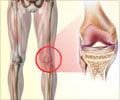Progesterone receptor proteins can act as a potential new target for reducing the risk of osteoporosis in men undergoing various prostate cancer therapy, finds a new study.
Highlights
- Increased vitamin D inactivation can lead to osteoporosis in men.
- Progesterone receptor proteins can now be targeted to reduce the risk of osteoporosis in men.
- Prostate cancer treatment can lead to reduced levels of sex hormones in men and this in turn can cause lower vitamin D levels and this increases the risk of bone fractures.
- Link found between male sex hormone levels and vitamin D and this may have therapeutic value for treating related deficiencies of the vitamin.
Androgen levels in men may be reduced by a variety of factors including normal aging or by some drug treatments, including prostate cancer therapy. Since prostate cancer affects approximately 1 in 9 men and vitamin D deficiency is known to be a common risk factor for bone fractures and developing osteoporosis, the present study aimed to further investigate the link between changes in androgen levels and normal vitamin D function.
Dr. Eui Ju Hong and colleagues at Chungnam National University investigated the effects of increasing or decreasing male sex hormone levels on several different markers of vitamin D function, in cell culture and experimental mouse models.
The team found that a deficiency of male sex hormones correlated with increased levels of an enzyme that inactivates vitamin D, which reduces its normal activity.
Their work showed that levels of this enzyme increased in the presence of another protein - the progesterone receptor. These receptors directly increase the levels of the vitamin D inactivating enzyme when androgen levels are low, and therefore could be a new target for treating vitamin D deficiency in patients with low androgen levels.
Source-Eurekalert
















